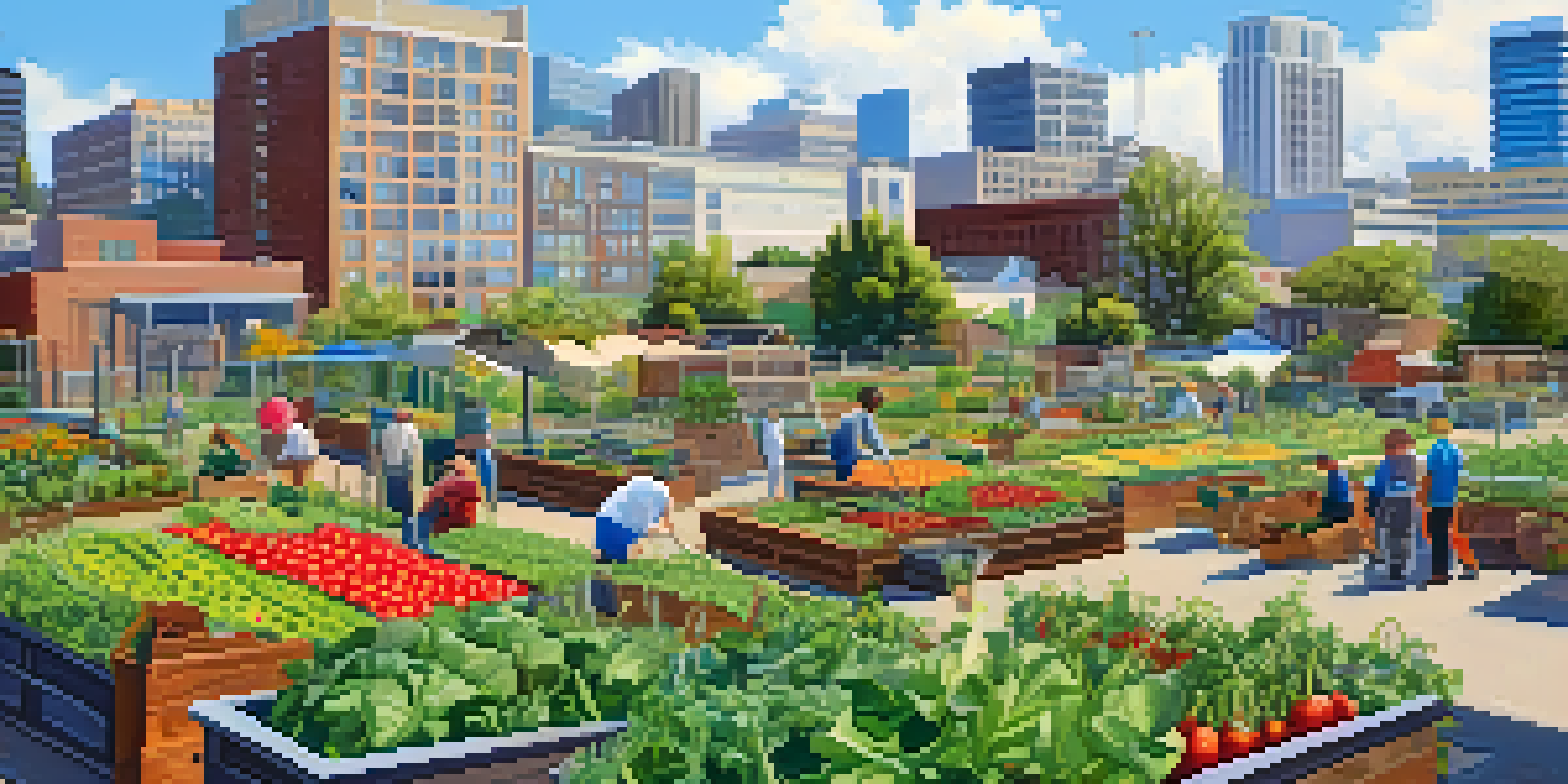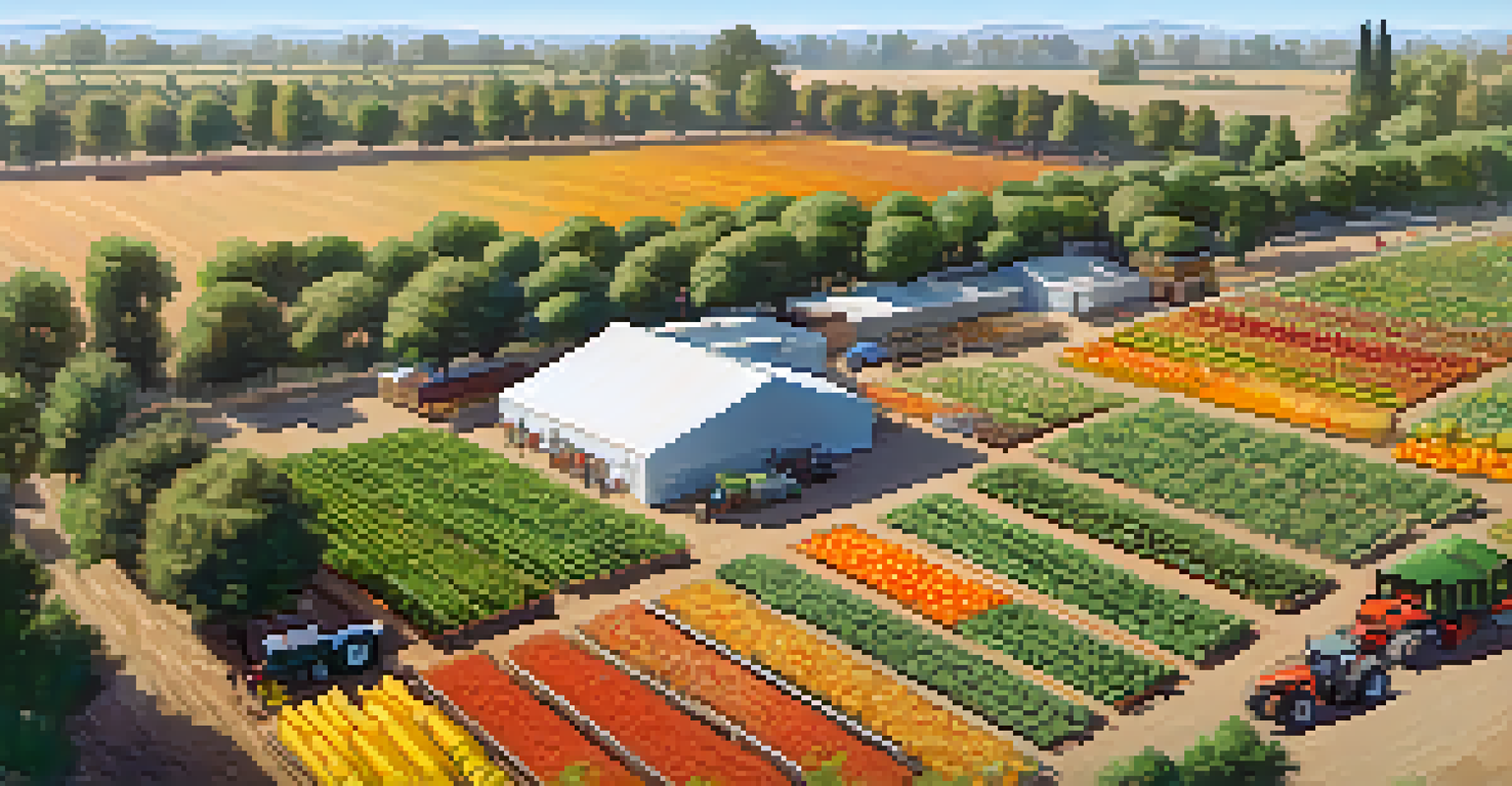Sustainable Farming Practices in Sacramento: A Growing Trend

The Rise of Sustainable Farming in Sacramento
In recent years, Sacramento has emerged as a hub for sustainable farming practices. This shift is largely driven by local farmers' commitment to environmental stewardship and community health. With the increasing awareness of climate change, many are looking for ways to produce food that doesn’t harm the planet.
The future of food is not just about feeding people, but also about nourishing the planet.
Farmers in the area are using innovative techniques that prioritize soil health, biodiversity, and water conservation. For instance, crop rotation and cover cropping are becoming common methods to enrich the soil naturally, reducing the need for chemical fertilizers. This approach not only benefits the crops but also contributes to a healthier ecosystem.
Moreover, the local government and various organizations are supporting these initiatives through grants and educational programs. This collaborative effort is creating a vibrant community that values sustainability and encourages more farmers to adopt similar practices.
Benefits of Sustainable Agriculture for Local Communities
Sustainable farming practices offer numerous benefits to Sacramento's local communities. One of the most significant advantages is the promotion of local food systems, which helps reduce the carbon footprint associated with transporting food over long distances. By sourcing food from nearby farms, residents can enjoy fresher produce while supporting their local economy.

Additionally, sustainable farming promotes healthier food options. Organic and sustainably grown fruits and vegetables are often free from harmful pesticides and chemicals, making them safer for consumers. This emphasis on health is vital for communities striving to combat diet-related health issues.
Sustainable Farming Benefits Communities
Sustainable farming practices promote local food systems, enhance community health, and increase resilience against economic fluctuations.
Furthermore, these practices can enhance community resilience. By fostering strong local food networks, communities can better withstand economic fluctuations and food supply disruptions, ensuring that residents have access to nutritious food year-round.
Innovative Techniques in Sustainable Farming
Farmers in Sacramento are employing a variety of innovative techniques to enhance sustainability. One popular method is permaculture, which designs agricultural systems that mimic natural ecosystems. This approach not only maximizes land use but also minimizes waste, creating a self-sustaining environment.
Sustainable farming is not about the farm. It’s about the community that surrounds it.
Another technique gaining traction is aquaponics, which combines aquaculture (raising fish) with hydroponics (growing plants in water). This system recycles water and nutrients, making it an incredibly efficient way to produce food. Local farms using aquaponics are setting examples for others, showcasing the potential for sustainable urban agriculture.
Moreover, many farmers are turning to technology, utilizing data and sensors to monitor soil health and crop conditions. This precision agriculture approach allows for more informed decision-making, leading to higher yields and reduced environmental impact.
Community Supported Agriculture (CSA) Initiatives
Community Supported Agriculture (CSA) has gained popularity in Sacramento as a way for consumers to connect directly with local farmers. In a CSA model, members pay upfront for a share of the farm's harvest, ensuring they receive fresh produce throughout the growing season. This arrangement fosters a sense of community and strengthens the bond between farmers and consumers.
Participating in a CSA not only provides access to seasonal, organic produce but also supports local agriculture. Members often receive unique crops that may not be available in grocery stores, encouraging them to explore new recipes and flavors. This experience can deepen their appreciation for local food systems.
Innovative Techniques Drive Growth
Farmers in Sacramento are implementing innovative methods like permaculture and aquaponics to maximize efficiency and sustainability.
Additionally, CSAs often offer educational opportunities, such as farm tours and workshops, which help members learn about sustainable farming practices. This knowledge empowers consumers to make informed choices about the food they eat and fosters a greater commitment to sustainability.
The Role of Urban Farming in Sacramento
Urban farming is another key aspect of Sacramento's sustainable agriculture movement. With increasing urbanization, many residents are transforming vacant lots and backyards into productive gardens. These urban farms not only provide fresh produce but also contribute to food security in densely populated areas.
In addition to growing food, urban farms often incorporate educational programs that teach residents about gardening, nutrition, and sustainability. This hands-on learning experience can motivate individuals and families to adopt healthier eating habits and consider their impact on the environment.
Furthermore, urban farming enhances community cohesion. Neighbors come together to cultivate gardens, share resources, and participate in local markets, fostering a sense of belonging and shared purpose in the pursuit of sustainability.
Challenges Faced by Sustainable Farmers
Despite the benefits, sustainable farmers in Sacramento face several challenges. One major hurdle is access to land, as urban development continues to encroach on agricultural areas. With rising property values, many farmers struggle to maintain their operations, leading to concerns about the future of local food production.
Additionally, sustainable farming can require more labor-intensive practices, which may deter some farmers who are accustomed to conventional methods. The transition to sustainable practices often involves a steep learning curve and can take time to yield financial returns, which can be daunting for those who rely on immediate profits.
Urban Farming Enhances Food Security
Urban farming initiatives are transforming vacant spaces into productive gardens, contributing to food security and community engagement.
Lastly, competition from large-scale agricultural operations can make it difficult for small, sustainable farms to thrive. Without the same economies of scale, these farmers must find unique ways to differentiate their products and connect with consumers who value sustainability.
The Future of Sustainable Farming in Sacramento
Looking ahead, the future of sustainable farming in Sacramento appears promising. As more consumers become aware of the environmental and health impacts of their food choices, the demand for sustainably produced goods is likely to rise. This trend could encourage more farmers to adopt eco-friendly practices, further enhancing the local food system.
Moreover, community support and government initiatives play a significant role in shaping the future landscape of agriculture in the region. Programs that provide funding, education, and resources for sustainable farming will be critical in helping farmers navigate challenges and innovate.

Ultimately, the continued growth of sustainable farming in Sacramento will depend on collaboration between farmers, consumers, and policymakers. By working together, they can create a resilient agricultural community that prioritizes environmental health and food security for generations to come.